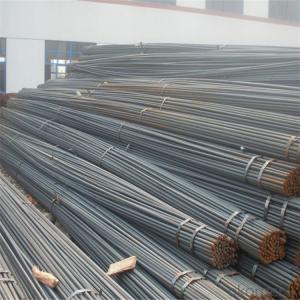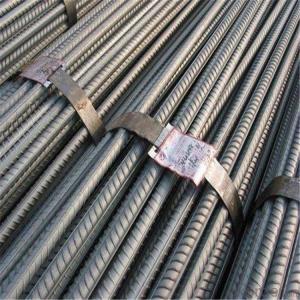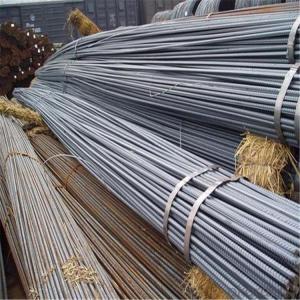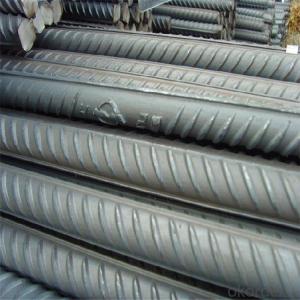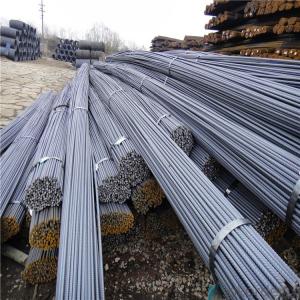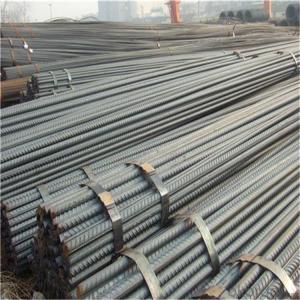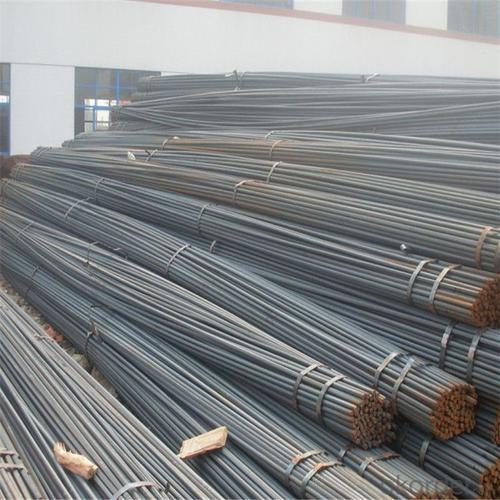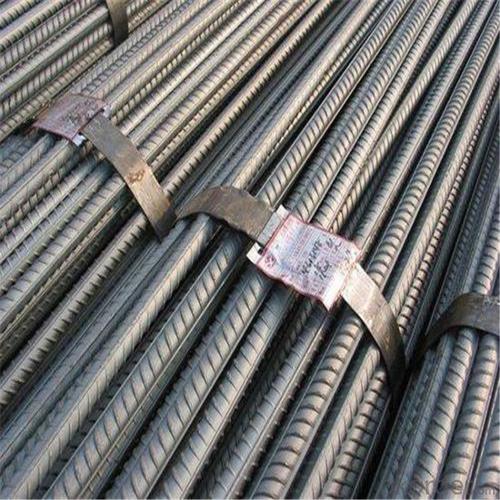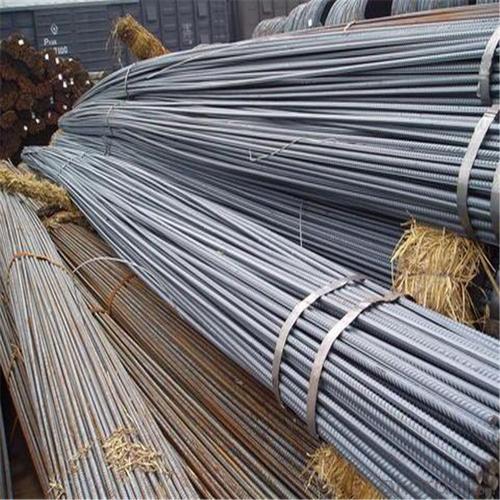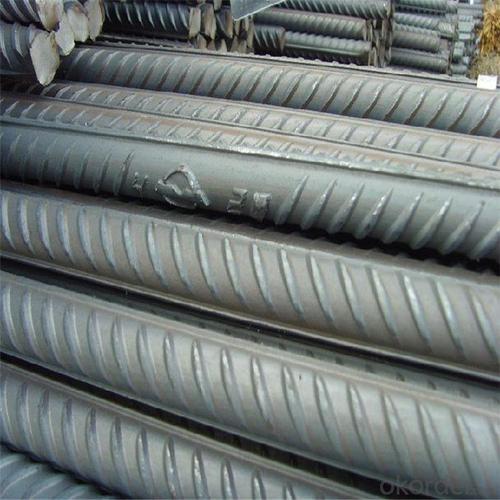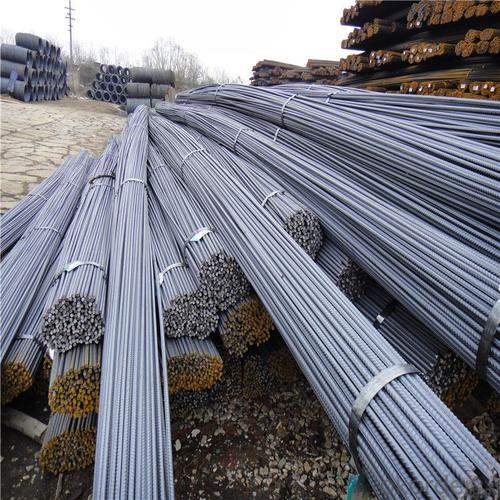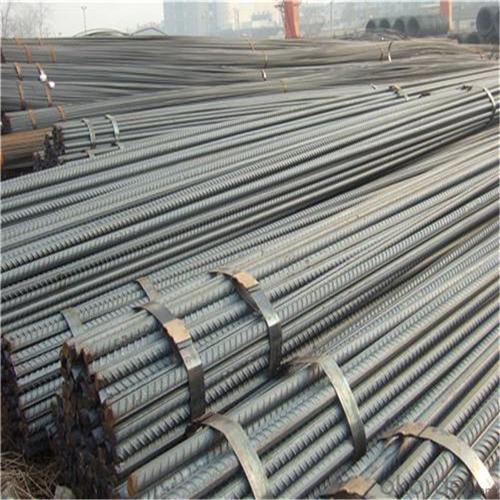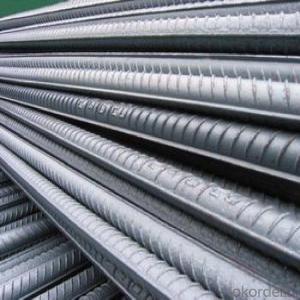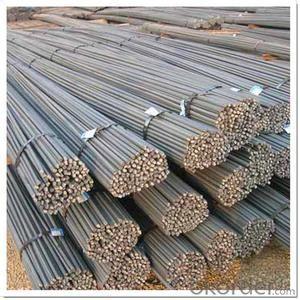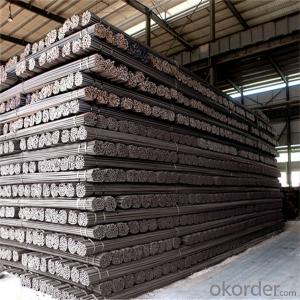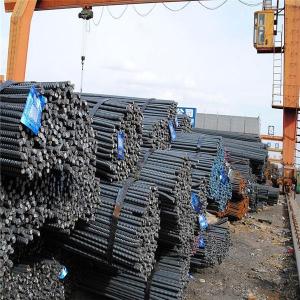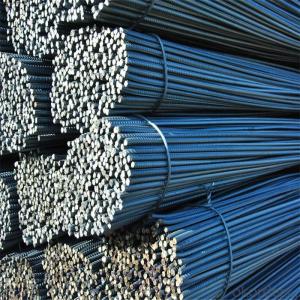Mild Steel HRB 400 Steel Rebar
- Loading Port:
- Tianjin
- Payment Terms:
- TT OR LC
- Min Order Qty:
- 130 m.t.
- Supply Capability:
- 50000 m.t./month
OKorder Service Pledge
OKorder Financial Service
You Might Also Like
Specification
Mild Steel HRB 400 Steel Rebar
Description of Mild Steel HRB 400 Steel Rebar
1, Diameter: 5.5mm-10mm Mild Steel HRB 400 Steel Rebar
10m- 40mm Mild Steel HRB 400 Steel Rebar
2, Length: 6m, 9m, 12m or customized
3, Standard: GB, ASTM, AISI, SAE, DIN, JIS, EN
OEM technology - send detailed technical parameters for accurate quotation.
2, Produce Process: smelt iron - EAF smelt billet - ESR smelt billet -
hot rolled or forged to get the steel round bar and plate
3, Heat Treatment: annealing, normalizing, tempering, quenching
4, Surface Treatment: Black
5, Quality Assurance: We accept third party inspection for all orders.
You can ask testing organizations such as SGS, BV, etc. to test our products before shipping.
Chemical Composition of Mild Steel HRB 400 Steel Rebar
Grade | Technical data of the original chemical composition(%) | |||||
Reinforcing steel bar HRB335 | C | Mn | Si | S | P | B |
≤0.25 | ≤1.60 | ≤0.80 | ≤0.045 | ≤0.045 | >0.0008 | |
Physics Capability | ||||||
Yield Strength(N/cm2) | Tensile Strength(N/cm2) | Elongation(%) | ||||
≥ 335 | ≥490 | ≥16 | ||||
Reinforcing steel bar HRB400 | C | Mn | Si | S | P | B |
≤0.25 | ≤0.16 | ≤0.80 | ≤0.045 | ≤0.045 | 0.04-0.12 | |
Physics Capability | ||||||
Yield Strength(N/cm2) | Tensile Strength(N/cm2) | Elongation(%) | ||||
≥ 400 | ≥ 570 | ≥ 14 | ||||
Products Show of Mild Steel HRB 400 Steel Rebar
Company Information
CNBM International Corporation is the most important trading platform of CNBM group.
Whith its advantages, CNBM International are mainly concentrate on Cement, Glass, Iron and Steel, Ceramics industries and devotes herself for supplying high qulity series of refractories as well as technical consultancies and logistics solutions.


F A Q
1, Your advantages?
professional products inquiry, products knowledge train (for agents), smooth goods delivery, excellent customer solution proposale
2, Test & Certificate?
SGS test is available, customer inspection before shipping is welcome, third party inspection is no problem
3, Factory or Trading Company?
CNBM is a trading company but we have so many protocol factories and CNBM works as a trading department of these factories. Also CNBM is the holding company of many factories.
4, Payment Terms?
30% TT as deposit and 70% before delivery.
Irrevocable L/C at sight.
5, Trading Terms?
EXW, FOB, CIF, FFR, CNF
6, After-sale Service?
CNBM provides the services and support you need for every step of our cooperation. We're the business partner you can trust.
For any problem, please kindly contact us at any your convenient time.
We'll reply you in our first priority within 24 hours.
- Q: How does bearing steel resist fatigue?
- Bearing steel resists fatigue due to its high strength, durability, and resistance to deformation. It has a carefully controlled chemical composition and heat treatment process that enhances its mechanical properties, such as hardness and toughness. This allows bearing steel to withstand repeated cycles of stress and loading without experiencing significant fatigue or failure. Additionally, its microstructure, including fine grain size and uniform distribution of carbides, helps to distribute stress evenly and prevent the formation of cracks or weak points that could lead to fatigue failure.
- Q: How does special steel contribute to the production of precision instruments?
- Special steel contributes to the production of precision instruments by offering high strength, durability, and resistance to corrosion. It provides the necessary stability and precision required for the manufacturing of sensitive components such as gears, bearings, and springs. Additionally, special steel's excellent machinability allows for intricate designs and precise shaping, ensuring the accuracy and reliability of the final product.
- Q: Can special steel be used in the production of springs?
- Yes, special steel can be used in the production of springs. Special steel, such as alloy steel, is often preferred for manufacturing springs due to its high strength, durability, and resistance to deformation. It allows for the production of springs that can withstand heavy loads, maintain their shape over time, and provide reliable performance in various applications.
- Q: How does special steel contribute to the manufacturing of medical implants?
- Special steel plays a crucial role in the manufacturing of medical implants due to its unique properties and characteristics. Medical implants require materials that are biocompatible, corrosion-resistant, and durable. Special steels, such as stainless steel, titanium alloys, and cobalt-chromium alloys, possess these desired qualities, making them ideal for medical implant production. Firstly, stainless steel is widely used in the manufacturing of medical implants due to its excellent corrosion resistance and high strength. It is often employed in applications like surgical instruments, orthopedic implants, and dental devices. Stainless steel implants can withstand the harsh physiological environment within the body, ensuring long-term performance and reducing the risk of complications. Titanium alloys are another type of special steel extensively used in medical implant manufacturing. These alloys offer high strength-to-weight ratio, exceptional biocompatibility, and resistance to corrosion. Titanium implants are commonly used in orthopedic surgeries, such as joint replacements, as well as dental implants. The biocompatible nature of titanium allows for better integration with the surrounding bone, promoting faster healing and reducing the risk of rejection. Cobalt-chromium alloys are yet another type of special steel utilized in the production of medical implants. These alloys possess excellent mechanical strength, wear resistance, and biocompatibility. Cobalt-chromium implants are frequently employed in orthopedic surgeries and cardiovascular interventions, such as stents. Their high strength ensures stability and longevity, while their biocompatibility minimizes adverse reactions and promotes patient recovery. Overall, special steel provides the necessary qualities required for manufacturing medical implants. Whether it is stainless steel, titanium alloys, or cobalt-chromium alloys, these materials contribute to the development of biocompatible, corrosion-resistant, and durable implants that improve patients' quality of life and ensure successful medical procedures.
- Q: How does special steel contribute to the automotive aftermarket industry?
- Special steel plays a significant role in the automotive aftermarket industry by offering various advantages that contribute to the overall performance, durability, and safety of vehicles. Firstly, special steel is known for its exceptional strength and durability. This property allows automotive manufacturers and aftermarket suppliers to develop high-performance components and parts that can withstand extreme conditions and heavy usage. Components such as engine parts, suspension systems, and chassis components benefit from the superior strength of special steel, ensuring their longevity and reliability. Additionally, special steel offers excellent corrosion resistance, which is crucial for automotive components exposed to various weather conditions and road environments. By using corrosion-resistant steel, aftermarket suppliers can produce parts that are less prone to rust and degradation, ultimately enhancing the lifespan of vehicles and reducing the need for frequent replacements. Furthermore, special steel enables the production of lightweight components without compromising on strength. With the increasing demand for fuel efficiency and reduced emissions, lightweight materials are highly sought after in the automotive industry. By utilizing special steel, aftermarket suppliers can create lightweight parts that contribute to improved fuel economy and overall performance of vehicles. Moreover, special steel's versatility allows for the development of complex and intricate components, contributing to advancements in vehicle technology. From precision-engineered gears and shafts to specialized parts for electric vehicles, special steel can be tailored to meet specific automotive requirements, supporting the industry's continuous innovation. Lastly, special steel offers cost-effectiveness in the automotive aftermarket industry. Although the initial cost of special steel might be higher than conventional steel, its durability and longevity result in reduced maintenance and replacement costs over time. This benefit is particularly significant for aftermarket suppliers and vehicle owners, as it helps minimize expenses and ensures a higher return on investment. In conclusion, special steel plays a vital role in the automotive aftermarket industry by providing strength, durability, corrosion resistance, lightweight properties, versatility, and cost-effectiveness. These qualities contribute to the overall performance, safety, and longevity of vehicles, making special steel a crucial material in the development of high-quality aftermarket components and parts.
- Q: Can special steel be used in the oil refinery industry?
- Yes, special steel can be used in the oil refinery industry. Special steel, such as stainless steel or high alloy steel, is often preferred in the oil refinery industry due to its superior corrosion resistance and high temperature strength. It is commonly used in various applications, including piping, tanks, heat exchangers, and valves, to ensure durability and reliability in the harsh and corrosive environment of oil refineries.
- Q: How does special steel contribute to the aerospace defense industry?
- Special steel plays a vital role in the aerospace defense industry as it offers the essential strength, durability, and resistance to extreme conditions needed for various applications in aircraft and defense systems. One of the primary contributions of special steel in this industry lies in its capacity to endure high temperatures and pressures. For instance, special steel alloys are utilized to manufacture turbine blades and other components in aircraft engines that are constantly exposed to exceedingly hot gases. These alloys possess excellent heat resistance properties, enabling them to maintain their strength and structural integrity even under such demanding circumstances. Furthermore, special steel exhibits exceptional resistance to corrosion and erosion, rendering it ideal for aerospace applications. Given that aircraft and defense systems often operate in harsh environments, including exposure to saltwater, moisture, and other corrosive elements, special steel alloys like stainless steel are employed to prevent rusting and corrosion. This ensures the longevity and dependability of critical components. Additionally, special steel is employed in the production of armor plates and ballistic protection systems for military vehicles and aircraft. Its high tensile strength and impact resistance make it an indispensable material for these applications, providing enhanced protection for military personnel and assets. Moreover, special steel finds application in the manufacturing of landing gears, wing components, and airframe structures. These components must withstand tremendous forces and stresses during takeoff, landing, and flight, making the strength and durability of special steel vital for the safety and performance of aerospace systems. In conclusion, special steel plays a crucial role in the aerospace defense industry by supplying the necessary strength, durability, and resistance to extreme conditions required for various applications. Its ability to endure high temperatures and pressures, resist corrosion and erosion, as well as its high tensile strength, make it an essential material in the manufacturing of aircraft engines, armor plates, ballistic protection systems, and other critical components.
- Q: What are the characteristics of high-speed steel?
- High-speed steel (HSS) is known for its exceptional durability and heat resistance. It has excellent hardness, toughness, and wear resistance, making it suitable for cutting tools and machining applications. HSS can withstand high temperatures without losing its hardness, allowing it to cut at high speeds without losing its sharpness. Additionally, it has good dimensional stability and can maintain its shape even under extreme conditions.
- Q: What are the different corrosion-resistant coatings for special steel?
- There are several different corrosion-resistant coatings available for special steel, each with their own unique properties and advantages. Some of the most common ones include: 1. Zinc Coating: Zinc coatings, such as galvanizing, are widely used to protect special steel from corrosion. The zinc layer acts as a sacrificial barrier, preventing the steel from coming into contact with corrosive elements. 2. Epoxy Coating: Epoxy coatings are a popular choice for corrosion protection due to their excellent adhesion, chemical resistance, and durability. They form a strong barrier that shields the special steel from moisture, chemicals, and other corrosive agents. 3. Polyurethane Coating: Polyurethane coatings provide exceptional resistance to abrasion, chemicals, and weathering. They are often used in harsh environments where the special steel is exposed to extreme conditions, such as offshore or marine applications. 4. Ceramic Coating: Ceramic coatings offer high-temperature resistance and excellent corrosion protection. They are commonly used in industries like aerospace and automotive, where the special steel needs to withstand extreme temperatures and corrosive environments. 5. Metal Coating: Metal coatings, such as nickel or chromium, are often applied to special steel to enhance its corrosion resistance. These coatings create a protective layer that prevents the steel from corroding by acting as a physical barrier. 6. Powder Coating: Powder coatings are applied electrostatically and then cured under heat, forming a hard and durable protective layer. They offer excellent corrosion resistance and can be customized in terms of color and texture. It is important to select the appropriate corrosion-resistant coating based on the specific requirements of the special steel and the environment in which it will be used. Factors such as temperature, exposure to chemicals or moisture, and the desired lifespan of the coating should all be considered when choosing the right coating.
- Q: How is special steel used in the manufacturing of tools and dies?
- Due to its exceptional properties, special steel is widely utilized in the production of tools and dies. Also known as tool steel, special steel is specifically engineered to possess high hardness, wear resistance, toughness, and heat resistance. When it comes to tool manufacturing, such as drills, saws, hammers, and chisels, special steel is employed to guarantee durability and prolonged tool lifespan. The high hardness of special steel enables these tools to endure the demands of cutting, drilling, and shaping without easily becoming dull or deformed. Moreover, the wear resistance of special steel ensures that these tools can maintain their sharp cutting edges for an extended period, reducing the need for frequent sharpening or replacement. Furthermore, in the manufacture of dies used in various manufacturing processes, special steel plays a vital role. Dies are utilized to shape materials into specific forms or sizes, such as in forging, stamping, or extrusion processes. Thanks to the high toughness of special steel, dies can withstand the high pressure and impact forces involved in these processes without cracking or fracturing. Additionally, the heat resistance of special steel ensures that dies can endure the elevated temperatures generated during these operations without losing their shape or hardness. Special steel also possesses excellent machinability, making it easy to shape and form into intricate tool and die designs. This quality holds great significance in manufacturing, as it allows for the production of precise and intricate tools and dies, resulting in improved product quality and efficiency. Overall, special steel is a crucial material in the production of tools and dies due to its outstanding hardness, wear resistance, toughness, heat resistance, and machinability. These properties guarantee the durability, prolonged tool lifespan, and high performance of tools and dies, thus contributing to the overall efficiency and quality of various manufacturing processes.
Send your message to us
Mild Steel HRB 400 Steel Rebar
- Loading Port:
- Tianjin
- Payment Terms:
- TT OR LC
- Min Order Qty:
- 130 m.t.
- Supply Capability:
- 50000 m.t./month
OKorder Service Pledge
OKorder Financial Service
Similar products
Hot products
Hot Searches
Related keywords
